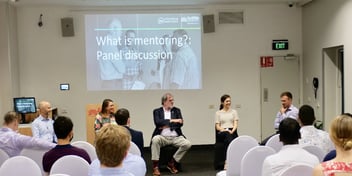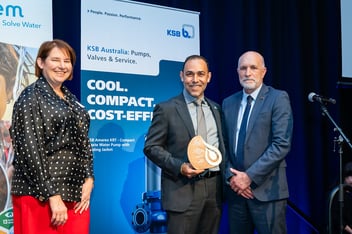Getting to SDG 6: Clean water and sanitation for all
By Thakshila Balasuriya, William Speirs and Courtney Brown.
If you walked into 25 King Street in Bowen Hills on the evening of Tuesday, 26 March you would have been forgiven for thinking you were walking into King Street’s trendiest new venue rather than the office of Aurecon.
A sea of young (and young at heart) water professionals were excitedly networking over canapes amongst the earthy tones of the world’s tallest timber office building. On this occasion, it wasn’t just the food attracting the crowd to King Street, but the sold-out Australian Water Association discussion panel event hosted by the Queensland Young Water Professionals, sponsored by Aurecon and Queensland Urban Utilities.
This year’s discussion panel was about how the water industry can best engage, support and lead efforts towards achieving Sustainable Development Goal 6: Clean water and sanitation (SDG 6).
The panel featured Unitywater Director Mike Williamson; Dr Regina Souter, WASH (water, sanitation and hygiene) specialist at the International WaterCentre; and Dr Donnell Davis from the United Nations Association of Australia and Soroptimist International.
Williamson shared the journey between Unitywater and Mornington Shire Council to improve water and sewer services to remote communities, benchmarking Australia’s contribution to development aid per capita, and asked the audience, “What can you do?”.
Souter shared her on the ground experience delivering water and sanitation services in developing countries, highlighting the technical and social barriers that must be considered, and emphasising the importance of local capacity building and assimilation of culture.
Meanwhile, Davis delivered a genuine, heartfelt acknowledgment of country, an introduction to the indigenous term Garriba (best water), a short history on the development of the SDGs, and a recap of the World Water Development Report and ethical water futures.
Overall, the panellists agreed the SDGs are more complex than the Millennium Development Goals, with reporting and accountability as major comparable components. There was also consensus that although the SDGs are definitely an improvement in terms of measurement of progress, there are many challenges still to be addressed.
It was apparent that private organisations in the water industry have much to add by creating supportive and sustainable cultures. An important point was made regarding investments and the need to be strategic rather than spending money on particular situations without much forethought.
However, developed nations do not always get it right when supporting other nations. There is a tendency to provide engineering solutions to issues that may be social and cultural in nature.
The panel and the audience discussed the need for a multi-pronged approach where governments, the private sector, NGOs, education centres, the ‘informal’ sector, and even local church groups can aid in building capacity to achieve SDG 6.
It was also highlighted that there is a need for nations receiving aid to have an accountable, responsible and transparent government, to make sure resources are not wasted or misused.
Finally, Australia in particular must not forget its responsibility to address the problems in its own backyard. Today, there are still many remote and regional communities in Australia that do not have clean, safe and reliable access to water and sanitation.
We’d like to acknowledge the speakers, our sponsors, audience, and the organising committee, namely Alice McConnell, Thakshila Balasuriya, Will Speirs, Jannah Baker and Queensland Branch Manager Sharon James for always assisting in the background. We hope to see you all again next year!
This article was originally written for Queensland Source.



